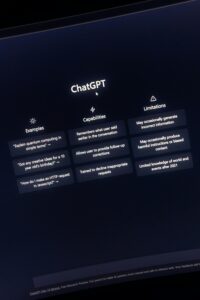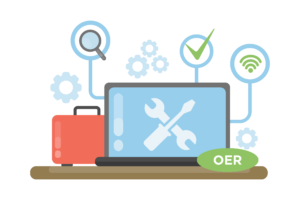
PDF Accessibility Decision Tree
Creating accessible PDFs can be challenging, but you may have access to alternative methods to create and identify accessible PDFs beyond using Adobe Acrobat. Navigate

Creating accessible PDFs can be challenging, but you may have access to alternative methods to create and identify accessible PDFs beyond using Adobe Acrobat. Navigate

One of the most common tools helping students with visual impairments navigate the digital world is the screen reader. These software programs convert text into

A syllabus is a great way to provide students with the course purpose, an overview of assignments, and the rules of engagement that you will

Quizzes are incredibly useful tools in any online course. They provide students with immediate feedback on their learning, build metacognitive skills, enhance motivation, and create

Assessments refer to the activities students complete to demonstrate their competency in relation to predefined learning objectives. Broadly speaking, there are two types of assessments

Build a foundation for assessment ideation with AI using the 3Ps of Quality Prompting. Then, take your AI assessment brainstorm to the next level with

Each page in your online course and every piece of content you create for your students is a chance for you to set the tone and climate, support discourse, and communicate your expectations. These pages and pieces of content represent “you” to your students, and they will look to these pages to help keep them engaged and encouraged.

Online courses must evolve as we learn more about how to combat inequalities in our classrooms. A commitment to diversity, equity, and inclusion in our courses is a commitment to student success.

In response to economic disparities, faculty can create more inclusive and equitable learning opportunities using open educational resources.

Traditionally, music composition has involved putting pen to paper, with students drawing dots and lines to create musical notes. In a physical classroom, this method

There are two key introductions for every online course: your personal intro and an introduction to the course. Below are some things to think about

What are some AI tools that you can incorporate into your online classroom to enhance student engagement, personalize learning, offer individualized feedback, and encourage additional

In online courses, students can feel isolated without the regular, human touchpoints that naturally occur in a physical classroom. Two easy, effective ways to intentionally

Just like a car needs regular maintenance to keep running smoothly, your online course also benefits from routine checkups. Proactive, preventative maintenance is especially important

An institution’s adoption of a master course philosophy involves the development of content for a single version of a course, which schools then duplicate every

Designing effective online courses require more than just content expertise—it calls for intentional strategies that foster engagement, relevance, accessibility, and real-world relevance in learning environments

Video content has become essential for engaging students, however, not all educational videos are created equal. Research consistently shows that shorter, well-structured videos lead to

First impressions are powerful and can significantly impact how people perceive and interact with others so, how you begin your modules sets the tone for

Creating and maintaining quality online courses can feel overwhelming especially when you are juggling work demands, deadlines, and student requests. One way to save yourself

Learning objectives are the foundation of any well-designed course. They define what we want our students to know and be able to do by the

Objectives play a fundamental role in designing effective instruction. Objectives enable instructors to identify what students should know at the conclusion of an instructional activity,

There are tons of Open Educational Resources and Open Educational Repositories available for you to feature in your courses. If you are just beginning your

What Is an Open Educational Resource (OER)? Open Educational Resources (OER) are educational materials that are free to use, re-use, and share for faculty and

Have you noticed terms like open education, textbook-free, or zero-textbook popping up more often in higher education discussions? These concepts are part of a growing

Just like a car needs regular maintenance to keep running smoothly, your online course also benefits from routine checkups. Proactive, preventative maintenance is especially important
Quality Matters (QM), a global organization leading quality assurance in online and innovative digital teaching and learning environments, has recently released their newest edition of the QM Higher Education Rubric.

Before developing your rubric, consider the assessment you are creating the rubric for. Ask yourself: Is my assessment developed completely? What are the course and
Live online course design and delivery webinars hosted by the Academic Services and Products team
Developed by Risepoint, Faculty eCommons (FeC) is a social learning ecosystem for faculty across the world to work together to improve online education. FeC contains resources specifically tailored to help online instructors and is maintained by the Academic Services and Products team at Risepoint.
The information provided on Faculty eCommons, including links to third-party websites, does not, and is not intended to, constitute legal advice; instead, all information, content, and materials on this website are for general informational purposes only.
Risepoint
700 North Pearl Street, Suite 600
Dallas, TX 75201
855-593-6050